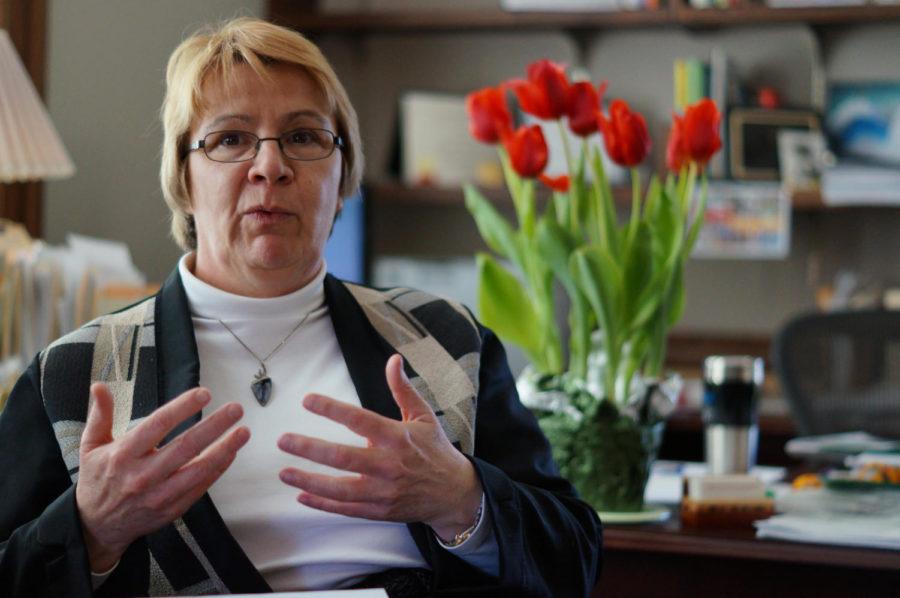Iowa State hopes to add three new programs
February 20, 2013
Iowa State hopes to add three new academic advantages to its already diverse list to help give students an edge.
Proposals of a master of finance, a public relations major and a landscape management minor are all in the works to be offered to students in the coming years.
None have been officially approved, but they have made it through the first reading at the Feb. 12 faculty senate meeting.
Both the master of finance and public relations major must be approved by the Board of Regents, whereas the minor only needs university authorization.
The 15-credit minor in landscape management was first suggested in the Department of Horticulture. Faculty from that department conversed with faculty from other departments such as landscape architecture, natural resources ecology and management, and agricultural education and studies to put together the appropriate curriculum.
The minor is designed for students who aren’t in horticulture or for those who want more of a focus as opposed to the broad blanket of a horticulture minor.
Ann Marie VanDerZanden, director of the Department of Horticulture, said, “In talking to a lot of students; many of them were taking this group of courses anyway. Horticulture is a field that is really broad. We wanted to get a program that was a bit more focused.”
The main difference between a minor in horticulture and that of landscape management is the optional courses students would take.
Landscape management’s curriculum would be centered on topics such as plant identification, landscape instillation, turf grass management, and landscape construction. Under the broad blanket of horticulture, students could take a random mix of classes without a central focus.
“[The minor] doesn’t require any new faculty and doesn’t require any new courses,” VanDerZanden said. “It’s a matter of packaging these existing courses and putting them into a group so the students can market [better] on transcripts.”
The program will be voted on at the faculty senate meeting on March 12. If approved, it will be ready to be offered.
A public relations major has potential to be added to the Greenlee School of Journalism and Communication in August 2013 if approved by the Board of Regents.
The Greenlee School has provided public relations courses for around 40 years as an emphasis area.
The current request to the Board of Regents is to promote the program to a degree level. Iowa State recognizes the growth of the public relations industry and is looking to provide students with the necessary training.
Since there are already numerous courses with public relations content and plenty of faculty, there is no anticipated need for additional resources to create the degree.
“We’re just talking about giving an emphasis that already exists a lot more visibility, and to give the students the recognition that comes with having an actual public relations major as opposed to having a journalism major with a public relations emphasis,” said Beate Schmittmann, dean of the College of Liberal Arts and Sciences.
According to the official proposal, the Council of Public Relations Firms saw a 60 percent increase of employees in its firms in 2011. Iowa Workforce Development expects an upsurge of about 21 percent in public relations jobs between 2008 and 2018.
“I talked to some of the Greenlee School alumni who said this was going to serve a need of the state and a need of the nation. They were very positive about it,” Schmittmann said. “We think that it’s a very simple and cost-effective way of giving some additional identity and additional recognition of the credentials of the students who are going to graduate with this degree.”
Hopes to create the first master of finance program of its kind in Iowa are high, as well.
The idea first formulated about two years ago when Travis Sapp, associate professor of finance, and Dermot Hayes, professor of economics, were discussing the Department of Economics’ master’s program. Sapp said he thought that something similar for the finance department would make sense.
“This is a very common program, and there is a lot of other perceived demand at other schools,” Sapp said. “If you look at Iowa, though, none of the regent schools offer a master in finance as a program. There is an unmet niche that I think we can fit quite well.”
Iowa does offer an MBA in corporate finance.
After a year or so of putting together a pitch, the finance department approved the proposal on Feb. 12, 2012.
The College of Business Curriculum Committee and the College of Business faculty both unanimously approved the program. If ratified by the Board of Regents, Sapp hopes they will be ready to provide students with the opportunity for the fall 2014 semester.
At least four courses will be added, possibly five, and one new faculty member will be brought on board to help carry course load. Forty credits will be required unless the student lacks the six prerequisites.
Sapp said that surveyed employers are “enthusiastic” about the idea.
“Some employers had told us, when they came to campus, they look for MS Stat or MS Econ programs for certain jobs, but the issue is, if [the position] has a strong finance component, the students are going to be weak in that area [because] they are so focused in econ or statistics,” Sapp said. “Hearing that, we felt like if we could do all of that in the finance department under one umbrella, then we could prepare students to step into these sorts of jobs.”
All three proposed programs have not yet been officially approved.
It is unknown when the Regents will discuss the matters.

















